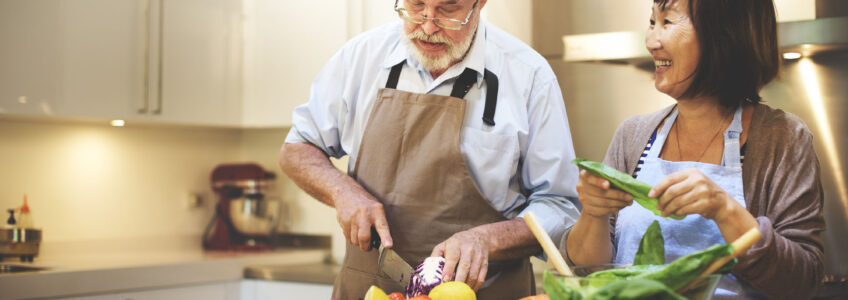
In many homes, the kitchen serves as the gathering space for families in addition to meal preparation. But as the years pass by, there are several areas of the kitchen that might become challenging for seniors to navigate and even dangerous. Thankfully, the kitchen may continue to be a secure, functional, and welcome area for seniors with the help of elder care providers, loved ones, and a few well-considered adjustments.
Increasing Safety and Accessibility
Seniors can cook with confidence when the kitchen is accessible. This starts with ensuring the most commonly used products are front and center. Additionally, when rearranging the space to make it more accessible, it’s important to put cookware, pans, and other equipment in lower cabinets or drawers to prevent the use of step stools.
Loved ones might also install lazy Susans or pull-out shelves in cabinets to reduce the amount of bending and reaching. Also, instead of using standard knobs, which can be challenging for arthritic hands to operate, consider installing D-shaped pulls or easy-to-grasp cabinet handles.
Beyond these adjustments, it’s essential to pay attention to the flooring in the kitchen area, particularly in areas close to the stove or sink. Loose rugs should be removed, and the flooring should be made of non-slip material. Lighting should be assessed as well to ensure seniors have plenty of light in prep areas and under cabinets. Motion-sensor lights might also be a good idea so they won’t have to fumble around for the light switch after dark.
Elder Care and Tools That Make Kitchen Tasks Easier
Seniors who still enjoy cooking, either on their own or with elder care providers and loved ones, will greatly benefit from tools that make cooking easier, including the following:
Ergonomic Kitchen Utensils: Choose utensils that are easier for arthritic hands to hold, such as those with large, non-slip grips. Also, when selecting new pots or pans, it’s important to make sure they’re lightweight and have two handles that offer superior control and stability. Finally, jar and can openers that are electric can ease the pressure on the hands and wrists.
Cut-Resistant Gloves and Safety Knives: Cut-resistant gloves and knives with integrated safety features, like rounded tips and slip-resistant handles, can help prevent mishaps for seniors who enjoy cooking but struggle with hand strength or coordination.
Induction cooktops: Induction cooktops minimize the risk of burns by heating just the cookware and not the stovetop itself. This makes them an excellent substitute for conventional stoves. To further increase safety, they also turn off automatically if no pan is detected.
Increasing Comfort in the Kitchen with the Help of Elder Care
Seniors might have difficulty standing for a long length of time, which is where anti-fatigue mats come in. Not only do they take the pressure off of standing, they are also often non-slip. Another tip for seniors who are preparing meals is to place a chair or stool with a backrest near their prep area. To lighten the load while maximizing safety, elder care professionals can help seniors with prep work. At the same time, seniors will be getting valuable companionship.
It’s easy to create a kitchen that is more accessible, safe, and welcoming for seniors by implementing a few of the changes above. Elder care providers might also be able to recommend other needed changes to ensure seniors have everything they need, such as multi-use appliances or lowered countertops.
Ultimately, helping seniors feel in control and safe in their space is the key.
If you or someone you know needs Elder Care in Fairmont, MN, contact Adara Home Health. We provide quality and affordable home care services for many fragile or senior members in the communities we serve. Call us at (888) 525-7742 for more information.
Sources:

